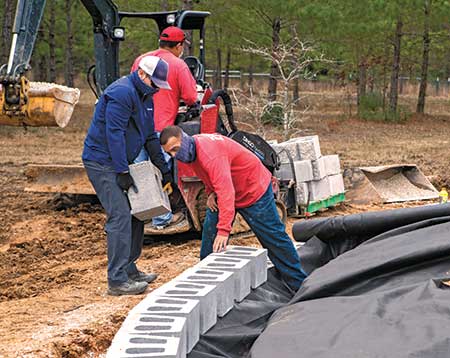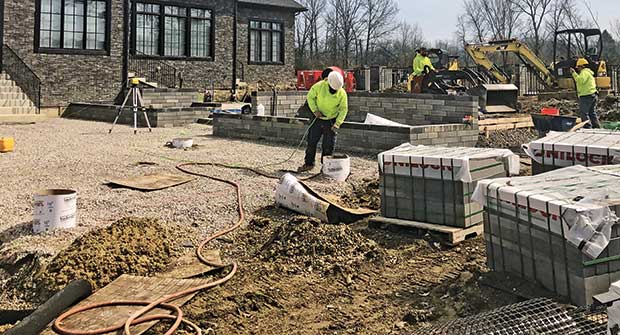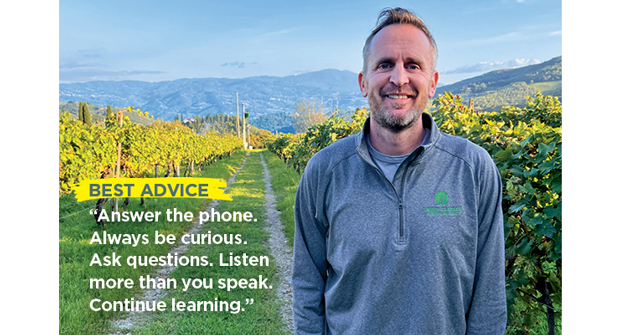2. Hire right
Deemer and Murray say they used to believe the myth that good employees were hard to find. However, this year, they filled all the Local Roots crew positions by mid-February.
“It’s true, you don’t have people lining up at your door like it used to be,” Deemer says. “There’s an effort to it. (We made a) serious investment both in our existing team and in finding and connecting with the right people to move forward.”
For Deemer and Murray, it started with building the right culture for existing employees. Local Roots emphasizes providing good pay, benefits, a team atmosphere and a good work environment. The company’s clientele is primarily residential, and it offers maintenance and design/build services. Local Roots has grown from $52,000 in 2014 to $2.4 million in 2020.

“The argument we refuse to believe was this idea that you can’t hire good help,” Murray says. “The issue is we can, but that comes at a cost. It’s not just throwing money at people’s faces anymore. People want a healthy, quality work environment.”
Deemer says the reputation he and Murray have built for Local Roots has paid off.
“It turns into a snowball effect that the more people that hear about it and want to be a part of it, that grows and attracts more good people,” he says.
Gembel’s email signature says, “Talent is a gift; character is a choice.” This mentality is a critical part of the hiring process for Atlas Outdoor, he says, and it’s something he’s learned along the way. He is currently hiring for a key sales role in the organization, and he’s using something he learned from Dave Ramsey’s solutions program: He’s interviewing the candidate’s spouse to see what type of support this candidate will have at home.
“I know the importance of a supportive spouse plays on the partner,” he says. “We’re hiring him, but we’re hiring her, too.”
3. Focus on customer service
When it comes to customer service, NeSmith and Gembel look to mimic Chick-fil-A.
“I’m obsessed with Chick-fil-A,” Gembel says. “It’s because of their culture.”
Gembel says the fast-food chain puts an emphasis on the experience. It’s often the person interfacing most with the customer who makes the biggest impression. Gembel says he empowers employees to make decisions like an owner, that everything — including the cleanliness of trucks and uniforms and interfacing with clients — matters.
“When you’ve got people that are in an entry-level position, think about the power that guy has for your company,” he says. “He is an ambassador for your brand. At Chick-fil-A, they use their front-line people, the ones who are checking you through at the drive-thru, bringing out your beverage, and it’s the same thing with us. A lot of times, the reason a customer will hire us, for, say, a $100,000 patio, is because they had a great experience with one of our front-line guys.”
NeSmith says looking at the overall Chick-fil-A experience has helped him impart his expectations to his employees. NeSmith uses the hashtag #NeSmithWay to brand the experience his customers can expect from his business.
“I want it to be a clean, easy and well-run business, and if we can do that, I think we can accomplish pretty much what we would like to accomplish,” he says. “(Chick-fil-A) figured out customer service and quality. If you can marry those, you can’t not be successful on some level.”
Tucker says Sugar Hill Outdoors has built its reputation and growth entirely on word of mouth by ensuring his clients are beyond satisfied with his company’s work. Sugar Hill Outdoors is a design/build company that serves a 70 percent residential, 30 percent commercial clientele. Tucker says his company did about $4 million in business last year.
“How I’ve built the business and how we expect to get more work is by doing a good job for the homeowner,” he says. “Ninety-nine percent of our work is word of mouth. I will not let a homeowner be unhappy. If something’s not right, we’ll tear it out and redo it. The most important thing is to not disappoint a client, to me. They’re my sales force.”


